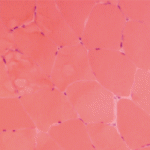
Tashatuvango / shutterstock.com
SAN DIEGO—In Hot Topics in Myositis, a session held Nov. 7 at the 2017 ACR/ARHP Annual Meeting, rheumatologists discussed treating myositis patients in three different clinical scenarios: persistently elevated creatine kinase (CK), immune-mediated necrotizing myopathies and lung disease.
Elevated CK
Patients with persistently elevated levels of CK enzyme and normal muscle strength “may still have minimal, nonspecific muscle symptoms, like a cramp or spasm that doesn’t interfere with their day-to-day life,” said Rohit Aggarwal, MD, MS, associate professor of medicine at the University of Pittsburgh Medical Center.
How do you proceed with these asymptomatic hyperCKemia patients? First, confirm whether a patient’s CK levels are truly elevated, he said. Thresholds for the upper limit of normal CK differ by race or ethnicity, and sex.1 Normal CK for African-American men is below 1,000, while normal for Caucasian men is below 200. CK levels are lower in women overall, but higher for African-American women than in Hispanic, Asian or Caucasian women. CK also decreases gradually with age.
Physical activity, particularly if it is unusual, “can have a transient CK increase up to 10–30 times the upper limit of normal,” said Dr. Aggarwal. “If you never exercise and go to the gym for an hour, your CK level can be really high.” After seven days of rest, about 70% of patients will have normal CK levels again, he said.
Based on the asymptomatic hyperCKemia guidelines, use a 97.5% cutoff for normal CK based on a patient’s race and sex, retest after seven days of rest, and look for 1.5 times the upper limit of normal to cut down on false positives.2 If a patient’s high CK levels are confirmed, look for non-neuromuscular causes that are easier to detect and treat, such as hypo- or hyperthyroidism, cardiovascular disease, pregnancy, celiac disease and medications. Statins are widely used and may raise CK levels from two to 10 times the upper limit of normal, he said.
“A common question is, ‘Do I need to stop the statin in someone with asymptomatic hyperCKemia? The answer is no. Can I start a statin if someone has asymptomatic hyperCKemia? The answer is absolutely yes,” he said. Check baseline CK before starting the patient on a statin. If they have no muscle symptoms, nothing more needs to be done. “If the patient does develop muscle symptoms, recheck the CK levels. If still normal and the patient has normal muscle strength, ask the patient if these symptoms are intolerable or if they affect day to day life. If not, continue the statin and follow up normally.” Patients with CK levels higher than five times the upper limit normal should stop their statin. Patients whose symptoms interfere with their daily life should also stop their statin, he said. After stopping the statin, muscle symptoms resolve in most cases.

